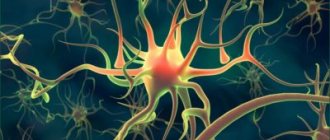Emotions are almost the most important thing in a person and inherent only to him. It is a mental state associated with the nervous system, caused by chemical changes that are variously associated with thoughts, feelings, behavioral responses and degrees of pleasure or displeasure.
There is currently no precise scientific definition. Emotions are often intertwined with mood, temperament, personality, character and motivation. They add color to our lives, describing feelings of sadness, joy, loneliness, fun and others.
What are emotions - definition and meaning
Human emotions are a mental process that arises in accordance with current situations.
The manifestation of emotions can be of different directions, and have both negative and positive connotations. This depends on the subjective evaluative opinion of each person. In simple language, emotions can be called the possibility of manifestation of experiences in the soul due to any situation. Translated from Latin, this word means “wave” or “shock.”
Thus, this is a certain process in which a person is not in a neutral state: he evaluates the situation with a certain sense of experience.
This condition overtakes a person from the inside. Externally the following signs appear:
- facial expressions;
- gestures and body position;
- voice;
- general behavior.
For example, you slipped on the street. In such a situation, many thoughts instantly arise in a person’s head: “How slippery! Now my leg hurts! You'll have to go to the emergency room.
Why do I even live in a country where there is winter?!” After assessing what happened, you will have a choice: silently keep your resentment and irritation to yourself, or lash out at some person, and it doesn’t matter whether you know him or not. Thanks to emotions, something special appears in our lives, motivating us to live.
Gray everyday life is brightened up with various feelings. Emotions help us live. Without them, human life would be like a robot's existence. Feelings are what distinguishes us from other creatures and objects.
Open the world of your own emotions
The ability to recognize your feelings is not only possible, it must be trained. To do this you can:
- Observe what bodily sensations occur in a certain situation. For example, a common feeling is a lump in the throat. You need to track this and try not to suppress it - go for this discomfort and allow it to manifest itself. Let the tears fall - if necessary.
- Observe what bodily sensations occur in a certain situation. For example, a common feeling is a lump in the throat. You need to track this and try not to suppress it - go for this discomfort and allow it to manifest itself. Let the tears fall - if necessary.
- Observe what bodily sensations occur in a certain situation. For example, a common feeling is a lump in the throat. You need to track this and try not to suppress it - go for this discomfort and allow it to manifest itself. Let the tears fall - if necessary.
- Observe what bodily sensations occur in a certain situation. For example, a common feeling is a lump in the throat. You need to track this and try not to suppress it - go for this discomfort and allow it to manifest itself. Let the tears fall - if necessary.
These workouts will give good results over time.
Emotions and feelings are different from each other
Emotions and feelings are an integral part of personality.
Thanks to emotions, people can distinguish good from bad and create amazing pictures, songs, or stories. Emotional richness makes our lives varied and interesting. Without emotions and feelings, a person will not be able to love and regret. All our feelings and emotions can sometimes cause the desire to act irrationally. Very often, feelings and emotions are used interchangeably. This is partly true, but there are some differences between these definitions:
- Emotions tend to last a short amount of time. For example, you bought a car that you have been wanting to buy for a long time. You will be happy for a while. Perhaps even the whole day. But gradually the emotion will subside, and you will begin to use your imagination and dream about something else. If it concerns a negative key, for example, if someone steps on your foot, you will become angry, but you will soon be able to forget about this incident, since there is no serious threat to your health;
- Feelings are long-term. They are also called emotions that arise in a person over a long period of time. For example, you can show the emotion of love for your child from the moment he is born. Or spend your entire life being angry at the person who broke your heart. In these cases, love and anger have been present in a person’s life for a very long time, this fact makes them feelings.
Emotions can become feelings. If we talk about the spectrum of positive emotions, then there is nothing bad. Chronic joy is not a disease. However, when people keep negative images within themselves for a long time, they begin to destroy themselves from the inside, which is very harmful to the spiritual and physical state of a person.
This can lead to apathy and depression. This happens due to the fact that at some point in time we did not allow the emotion to come out. For example, if a person at school age was offended by a classmate and he could not do anything to him, in the depths of his soul, unexpressed emotions will be deposited. They will make him remember this situation again and again in his thoughts, and he will become more irritated.
Don't keep all your emotions inside. Everything you feel has strong energy that can harm your health. To prevent this from happening, you need to show your emotions. When expressing your feelings, remember that your actions may harm your loved ones or people around you, so try to respond to situations within the bounds of accepted decency
Emotions must be brought out and not kept inside, because negative emotions can significantly ruin a person’s life. Negative emotions that a person experiences for a long time can provoke a depressive state. A strong blow to the nervous system will cause great damage to health and cause emotional instability.
Division of feelings into three varieties
In order not to fall into a depressed state, a person must realize that how he will deal with his inner experiences depends only on him.
A long stay in oppression can develop into a chronic psychological illness. To understand what feelings there are, you can guess and make a lot of assumptions. After all, each of us can perceive certain feelings differently. Some people are capable of experiencing experiences very deeply and for a long time, while others are given the ability to have short-term emotional experiences. Each person is able to feel depending on his character, principle or accumulated experience in life, and the difference in feelings also depends on the person’s temperament.
Moral feelings
They manifest themselves in people in relation to each other or in relation to their own actions. As a rule, the classification of feelings is determined by the subject’s sphere of residence in society. This gives rise to the following emotional manifestations:
- hatred;
- Love;
- sympathy;
- antipathy;
- charity;
- respect for other subjects;
- feeling of conscience, gratitude.
This also includes friendship and collective affection.
All these qualities manifest themselves depending on the norms of moral behavior accepted in social society. In addition, such sensations can be caused depending on a person’s worldview and his outlook on life and established beliefs. In the case when an action corresponds to accepted moral standards, a person will feel satisfaction, but if actions do not correspond to recognized canons, then people will feel dissatisfied.
Intellectual feelings
Mental experience caused by mental activity. When a person gets positive results from his work, he will feel joy, peace and joy. Such feelings motivate people to make new discoveries or become more productive. But if you fail in your endeavors, then there will be a feeling of frustration and painful perception that will cause reduced efficiency or complete refusal to complete any tasks.
Aesthetic feelings
When you witness something beautiful, you will receive a lot of positive emotions. When contemplating beautiful landscapes, objects of art, looking at talented people or creating beautiful creations, you begin to experience a feeling of delight and bliss that gives you strength for new discoveries and motivates you to do great things.
This is not a complete list; in fact, the palette of emotions and feelings is so vast that it is impossible to describe in words all emotional experiences. But, nevertheless, this is more than enough to classify the main emotional components.
Why do people need emotions (the main functions of emotions)
Signal. Perhaps the most important function. Its essence is to express a person’s desire. It helps to understand what a person wants at a given time. Thanks to it, a person can build his future steps.
Motivational-regulating. In many ways similar to the signal one. Its difference is that it helps to build a plan of steps for the long term, while the signal one helps to make a decision immediately in a stressful situation.
Communicative. Of course, emotions play an important role in communication. Thanks to them, we can see what mood our interlocutor is in. We will be able to clearly see emotions such as sadness or anger and, based on the information received, we will understand how to build communication.
Protective. In some situations, emotions can save us from any external influences. For example, fear and cowardice will take us away from a dangerous place and save our lives and nerve cells.
Emotions largely depend on the person and his thoughts. If he thinks about positive things, then he will not be tormented by negative feelings. And if a person is fixated on the bad, then he will perceive everything bad that happens around him personally.
Joy
This is a universal fixing feeling. It arises when a person perceives the surrounding and internal environment only as good and favorable. A person experiences a feeling of joy when positive events occur. This can be both external and internal, for example, a person remembered something good, and this allowed him to feel joy. Both an expected event and an unexpected but desired event can cause joy.
Why do people experience emotions?
Emotions arise spontaneously, but certain factors are necessary for their occurrence.
For example, if a person is in great pain, then you can see the corresponding facial expressions on his face, and he may also scream. Each person has his own emotional threshold of sensitivity. Therefore, each person reacts differently to the same situations. We probably have emotions because they help us survive. But they can also drive us crazy when they control us too much.
There is another reason why we have developed emotions. It lies in the fact that emotions help build relationships and connect communities of people. We would not be able to coordinate our goals so well if we did not love, fear, trust, and have a sense of pride.
A person is predisposed to experience certain feelings that are necessary not only for survival and relationship building, but also for everyday life. Without emotions we would live like robots. Work would be monotonous, like all of life. Emotions color our world.
Feelings are forbidden
Very often feelings are forbidden. From childhood we may be told: “Boys don’t cry,” and grown men do not allow themselves to be sad. They suppress sadness by seeking solace in work, alcohol, or paying with psychosomatic illnesses. We may hear from our parents or significant others: “Don’t be upset!”, and, as a result, in adulthood we suppress disappointment and sadness, trying to be strong, enduring everything that brings us discomfort. From all sides, society broadcasts: “You can’t be angry! Anger is destructive! As a result, for many it is taboo and, as a rule, its frequent suppression leads to a feeling of helplessness, a lack of control over one’s life and what is happening in it and the ability to protect one’s borders.
What types of emotions are there?
There are a large number of emotions, thanks to which we have the opportunity to better perceive our world. Until recently, scientists believed that there were only 7 basic feelings. However, recent studies have proven that there are many times more emotions, about 27.
Globally they are divided into three parts: positive, neutral and negative. According to the degree of manifestation, they can be sthenic (manifest very actively) and non-sthenic (almost not manifest).
Despite the fact that in the global sense there are only 3, there are many more subtypes:
- Basic. These emotions are inherent to every person. They do not depend on gender, age, nationality. Everyone knows how to be sad and happy;
- Variable. Due to territorial characteristics;
- Congenital. Emotions we are born with. For example, fear of heights;
- Purchased. Emotions that we acquire throughout life. For example, after a car accident, people may become afraid to drive private vehicles;
- Elementary. Neutral. Mainly emotions of calm;
- Composite. They are a combination of elementary;
- Natural. Inherent in man by nature
- Cultural. Emotions received in the process of learning from their parents or mentors;
- Cognitively simple. We experience such emotions as a result of instant reactions to any stimulus;
- Cognitively challenging. Unlike cognitively simple ones, such emotions are born after a deep understanding of what happened.
Thanks to the expanded classification system of our functions, we have many possibilities for expressing emotionality.
Positive emotions
As mentioned above, emotions can be negative and positive. Most people like to feel good, and positive emotions help us feel uplifted and more comfortable. Positive emotions usually do not need a reason; we feel them involuntarily.
Experiencing emotions such as happiness, excitement, joy, hope and inspiration are vital for anyone who wants to lead a happy and healthy life. Luckily, you don't have to experience them all the time to reap the benefits of positive emotions.
These moments, often fleeting, can be what make your life better and brighter. Beyond just feeling good, positive emotions are also an important part of happiness. Moreover, happy people live longer and work better.
Negative emotions
Negative emotion or affect is the experience of negative emotions such as anger, frustration, guilt, nervousness and fear. Causing negative emotions in your friends when they are enraged by your behavior is one of the ways to make them angry.
Therefore, it is important to learn how to prevent negative influences from affecting you and instead create positive emotions. To do this, it is enough not to be an irritant to other people and to behave correctly in certain situations. It is important to understand how much your behavior will be accepted by society at the right time.
A person can mask his emotions depending on the situation in which he finds himself. In our society, many emotions are considered to be a sign of weakness, therefore, people often hide their emotional experiences and try to smile in those moments when there is no joy in their souls
List of all emotions (most common)
Among all known human emotions, the most powerful are the emotions from the list below:
- Anger. Has anyone ever told you not to do what you want? How are you feeling? Is your blood starting to boil, is your temperature rising? This is usually how anger is described. Your body reacts to something that is not happening your way, and this is an attempt to correct the situation;
- Sadness. If you miss a deadline, get a bad grade, or don't complete work, you'll probably feel upset. Sadness happens when we are unhappy with ourselves, our accomplishments, or the behavior of someone else around us. Sadness can be a healthy experience because it indicates that we are passionate about something. It can be a great catalyst for achieving change;
- Joy is a feeling of delight, happiness, and perhaps even euphoria, often experienced as a sudden surge due to something good;
- Hope is a feeling of optimism and anticipation of a positive future;
- Pride is a feeling of self-approval and pleasure in an achievement or skill.
To prevent your emotional state from harming you and your environment, you need to learn to control your feelings and emotions. Despite the fact that emotions arise on their own, it is quite possible to curb them. In any current situation, you need to look at the circumstances soberly in order to prevent bad consequences.
A list of a person’s emotions and feelings will help you understand your inner state. Using this table, you can divide our emotions into certain groups in order to understand your inner world more deeply and stop in time if the situation gets out of control.
Recognizing Negative Experiences
Many psychological attitudes originate in childhood and adolescence. One of the most unpleasant, but at the same time widespread: “Why should I express my feelings, no one takes them seriously.” Most often this is started by parents, but it can also “grow up” at school.
Another belief is often instilled among children: “If I behave sincerely, everyone will laugh at me.”
Giphy
These psychological traps can haunt you throughout your life. There is a certainty that emotions are dangerous. But, if you look around, it becomes clear: such thoughts are no longer relevant.
How to learn to control your emotions
To avoid an outburst of emotions, it is worth taking a few simple steps to calm your agitated spirit and restless mind. When the situation passes, believe me, you will thank yourself for being able to keep your emotions in check and become your own boss.
Fully managing yourself emotionally requires mental discipline and sacrifice. For those who are primarily familiar with their sentimental experience, managing emotions can be one of the most difficult aspects of life.
Having a reliable method in your arsenal is a game changer. We are going to share a technique that many famous people use to constantly monitor their condition and free their mind from constant indulgence in the vast emotional palette offered to us all.
Everyone experiences negative and unproductive thoughts, and most of us can remember ones that have left us confused, wondering what alternate universe or reality they came from.
You can't always control the crazy things that come into your head, but you can control how long that thought stays constant, whether you allow it to take root, influence your feelings, and ultimately dictate your actions. Although you cannot have absolute control over your feelings, you can control some of them through closed action.
The path of closed action is a phenomenon in which a person suppresses feelings within himself for a certain period of time. For example, it is better to contain your anger if you are sitting in your boss’s office.
Depending on what emotions a person experiences. Internal energy in the body is concentrated in the form shown in the figure. Understanding this, you can direct the flow of this energetic charge in the right direction and learn to control yourself in any situation
How to get it or where to get it?
Everyone has probably had days “when you give up, and there are no words, no music, no strength. ”
On days like these, nothing makes you happy and you don’t really want to do anything.
The main thing is not to let this internal state consume you entirely. This can lead to mental illness.
As you know, “saving drowning people is the work of the drowning people themselves,” which means we need to do something about it and get these very positive emotions from somewhere.
Here are a number of tips that can help cope with blues, apathy and even depression and call on positive emotions to help yourself:
- Change the environment , it could be a simple visit to people you like or a trip.
- Try to find yourself a hobby , this is great relaxation and the opportunity to do what you enjoy.
- Call old friends whom you haven't seen for a long time, or meet them in a cafe or other pleasant environment.
- Listen to your favorite music and even dance to it.
- Go in for sports or physical exercise, run along the alleys, rollerblade, bike, run on a treadmill in the gym, swim in the pool.
- Change your external image , go to a hairdresser, a makeup artist, a cosmetologist.
- Walk through your favorite places in your locality, which are associated with good memories from childhood or adolescence.
- Go to your or your friends’ dacha, do physical labor there, take a walk, cook a barbecue and barbecue.
- If leaving the house is still a problem for you, then find forums with people on the Internet . Those close to you in spirit and hobbies, communicate with them, share your thoughts.
- Set yourself up to receive positive emotions even from good weather.
In the process of tuning into positive emotions, it is important to give yourself the mindset that you, a happy person, simply live and have many options to diversify your life and see the good even in ordinary things.
For example, you went outside, the weather is rainy, windy, nothing predicts an improvement in your mood, but note that autumn nature, even in the rain, is full of colors and shades.
Take a walk through the park and enjoy the colors of golden autumn. The internal attitude will definitely work, and you will move away from your dark thoughts and experiences.
How to express emotions
Many people find it difficult to express their emotions. Some people overexpress how they feel, while others don't share at all. Knowing how to accurately express your emotions will help you in your personal, social, and professional life. There are many theories and techniques that teach how to suppress or control emotions. This approach has been proven to not actually be effective.
Emotions and feelings are spontaneous and automatic, and must be felt and expressed. It has been scientifically proven that avoiding and suppressing them can have negative psychological consequences. Modern therapies such as acceptance, commitment and other techniques such as mindfulness can help you accept your feelings and learn how to restore them.
Your emotions are a part of you and need to be taken care of. To express emotions correctly, you must understand the situation you are in.
You need to learn to recognize feelings. You need to see the line between places where you can behave without restrictions, and where you definitely need to control yourself.
It is worth paying special attention to your inner state. To act and react correctly in certain situations, you must always be calm. If you are confused, then most likely the situation you are in will very quickly get out of control
Meditation exercise for understanding emotions
When working with clients, I often use a meditation exercise to help them better understand their own emotions. It is so effective that I decided to make an audio recording so that anyone could use this technique. The mechanism of action of the exercise is based on the connection between emotions and bodily reactions. Any, even the most insignificant, emotion is reflected in the body (read more about this here). By learning to listen to your own bodily reactions, you can become more familiar with your emotions.
You can do the exercise right now. Here's the entry:
Once you have learned what emotions are like and have easily learned to describe your inner state, you may be interested in exploring yourself more deeply. For example, you may want to figure out what positive meaning emotions can carry that, at first glance, are absolutely meaningless and even harmful. Read about this in the next article.
Benefits and harms of emotional state
Sometimes an emotional state can lead to a real disaster. This happens because there is always a need for a balance between negative and positive emotions. If you are too happy, almost to the point of euphoria, you will not be able to concentrate on work or school and will subsequently produce poor results.
This fact is called compensation. We also get harm from negative feelings; we can be sad for so long that we become depressed. We can also benefit from our emotional state. Thanks to some facts that please us, we feel more confident and courageous.
You should take your ability to control your own emotional state very seriously. After all, it has long been proven that oversaturated emotions can cause serious illnesses
Damage to the integrity of your energy shell opens up the possibility of many mental and physical illnesses. In the early stages of this gap, you can correct this situation without much difficulty.
You can seek advice from healers who will explain your problem and help prevent further destruction of the energy shell.
Summarizing
So, emotions are an important chemical process inside the human brain that regulates the psychological part of his life.
Feelings help us respond to any stimuli from the outside world. As a rule, they are accompanied by some changes in the body. They are divided into several types and have many functions. They brighten up our lives and, without any doubt, are our internal guidelines that help us choose the right step in any situation.
People need to be sure to respect their emotions and not keep them inside, as this can be dangerous due to the possibility of falling into depression and other mental illnesses.











